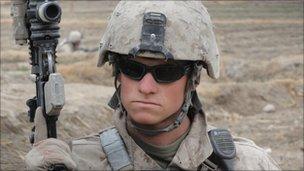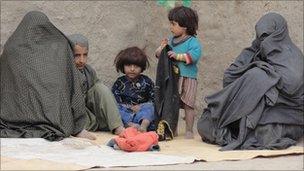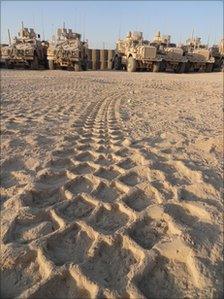Sangin: US Marines take fight to the Afghan Taliban
- Published

US Marines say they have killed hundreds of Taliban fighters since arriving in Sangin
The US Marines have pursued aggressive tactics in flashpoint town Sangin since replacing British forces in the southern Afghan town several months ago. The BBC's Paul Wood, embedded with US Marine Battalion 3/5, reports on the continuing fight against the Taliban.
"Come on, come out come and play," said the Marine sniper.
He spoke as he looked through his telescopic sight at a Taliban "spotter" who had just jumped behind a wall some 800m away. The man was not armed but was talking into a radio.
"Got P-I-D [positive identification]," said the sniper. "Cleared to engage." There was the suppressed crack of a silenced sniper round. The man fell to the ground.
"Enemy KIA (killed in action). Doin' the dead man dance."
"Good shooting, bro," came the reply.
It was the 50th kill for this sniper team. The US Marines believe they have accounted for hundreds of Taliban since they arrived in Sangin four months ago, relieving the British forces here.
Back then, the Marines say, they were coming under fire in their main bases every day. Now the fighting has moved to the countryside.
Tactics changed
The Marines say they have created an expanding "bubble of security" which includes Sangin town, the bazaar and the main road through the district, route 611.
This has been achieved, they believe, through new tactics. The UK forces had strung out a series of small patrol bases along route 611. The Americans closed half of them, making more forces available to pursue the Taliban.
"A change was needed and that change was to free up forces to manoeuvre against the enemy," said the Helmand commander, US Marine Corps General Richard Mills, talking about his approach over the whole of the province.
"The tactics before I got here were focused a little bit too heavily on the local areas. I wanted to regain the momentum of the attack... I wanted to put the pressure on the Taliban."
Gen Mills was full of praise for the UK military. The Marines were building on the success of the British forces who held Sangin before them, he said. But the Marines also believe they are pushing out further and harder than any unit before them.
This has come at a high cost. The battalion in Sangin, the 3/5 or "dark horse", has had at least 26 killed in four months, about a quarter of the losses the British suffered over four years.
The platoon we joined had a 20% casualty rate, two killed and nine seriously injured out of 56 men.
Most of those casualties have been from IEDs (improvised explosive devices, or home-made bombs) buried in the ground.
Taliban support

The military operation in Afghanistan also aims to win over the hearts and minds of local people
"The reason the Marines have pushed out from Sangin so fast, more quickly than anyone thought they could, is because they are being aggressive and because the high command is letting them be aggressive," said the military historian, Bing West, who was visiting Sangin and had joined the patrol.
"I don't think the British [soldiers and marines] were doing something wrong. But something happened in the British spirit about casualties - I mean right at the top - that prevented them from doing what the [US] marines are doing."
That is a controversial view and there may be many reasons for the American success. They have more helicopters and more cover from fast jets than the British did. But the Americans are certainly engaged in a "very high tempo of operations" and that will have an effect on the ground.
The question is, will the gains last? The Marines acknowledge that you can kill many Taliban but there will always be more volunteers. For the Marines' success to be durable, they need to win over the local population.
That may prove difficult. One military official working in "human terrain analysis" told me he thought that 75-80% of the people of Sangin supported the Taliban.
This is not an exact science and a Sangin schoolteacher - who opposed the Taliban because they were "uneducated" - told me they had support from only a quarter of the population.
But again and again, the Marines come across locals who say that a brother, a son or a cousin has been shot by the international forces.
"We don't want your help," said a group of elders going to pray for a relative who had been killed. They refused the offer of compensation from the platoon's lieutenant.
"We don't want your money. You shouldn't kill us. You shouldn't destroy our property. You even shot one of my cows yesterday. What sin did the cow commit?"
Reprisal fears

US soldiers are pursuing Taliban fighters in the countryside
At a nearby mud-walled compound, the Marines met some local people who opposed the Taliban - but also said they feared the insurgents. The squad was trying to persuade the head of the household to go to Sangin to claim money for a door they've just kicked in.
"There are Taliban on the roads," he replied. "They will beat or kill me. If I go to the town for money from you, they will hang me by the neck."
The Marines are acutely aware they are in a competition for local public opinion with the Taliban.
In fact, the people the Marines need to win over are the Taliban themselves.
Only 10-15% are thought to be "irreconcilables", hardliners sent from outside the province. Most are local farmers, criminal gangs and drug-traffickers operating under a Taliban flag of convenience. It is hoped that these Taliban can be persuaded to switch sides.
By going out to fight every day, the US Marines are trying to demonstrate that they have the momentum on the battlefield. They hope to convince the different armed groups of Sangin that Nato will be the eventual winner of this contest.
When enough blood has been shed to change public opinion, security responsibilities will be handed to the Afghans. As one member of "dark horse" declared: "We cannot fight their war forever."